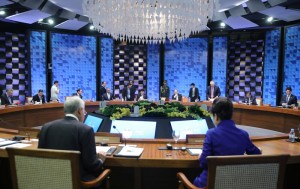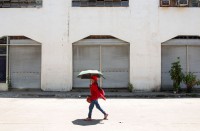
(MANILA) — Amid the shadow cast by recent deadly attacks against Russia and France supposedly perpetrated by the Islamic State terrorist organization known as ISIS, the leaders of the 21 Asia-Pacific Economic Cooperation (APEC) member economies strongly condemned on Thursday all acts, methods, and practices of terrorism in all their forms and manifestations
In their official declaration issued following their talks in Manila, the APEC leaders said they will not “allow terrorism to threaten the fundamental values that underpin our free and open economies”.
“Economic growth, prosperity, and opportunity are among the most powerful tools to address the root causes of terrorism and radicalization. We stress the urgent need for increased international cooperation and solidarity in the fight against terrorism,” the APEC leaders said as they went beyond the recommendations made by APEC ministers, the result of dialogues conducted throughout the year among APEC senior officials and various committees.
The leaders’ declaration normally draws from that of the ministers, who in turn draw from that of senior officials. The terror attacks have however weighed heavily on the APEC, causing increased security measures for the international event.
The APEC leaders, who gathered in Manila this week for the 2015 APEC Economic Leaders’ Meeting, specifically called for the full implementation of the APEC Consolidated Counter-Terrorism and Secure Trade Strategy.
They called for continued individual and collective actions, as well as sharing of best practices, in securing infrastructure, travel, supply chains, and financial systems from acts of terrorism.
“Under the shadow cast by the terrorist attacks in Paris, Beirut, and against Russian aircraft over the Sinai, and elsewhere, we strongly condemn all acts, methods, and practices of terrorism in all their forms and manifestations,” the leaders said in the declaration.
“We will not allow terrorism to threaten the fundamental values that underpin our free and open economies,” they added.
On Wednesday, Russia’s Prime Minister Dmitry Medvedev called on APEC for a coordinated fight against terrorism, saying it is a “challenge to the whole civilized world”.
Terrorism is “not a crime against one country. It is a crime against the whole world,” said Medvedev, who attended the APEC Summit on behalf of Russian President Vladimir Putin.
Terror attacks, such as those against a Russian aircraft that killed 224 passengers, are an area of cooperation that the APEC should engage in, Medvedev said.
On October 31, a 1-kilogram TNT bomb planted on a Russian A321 airliner killed all 224 people on board, mostly Russian tourists going home after spending their holidays in Egypt.
On November 12, dual suicide bombings took more than 40 lives in Beirut, Lebanon.
On November 13, seven coordinated terror attacks in Paris killed at least 129 people. Attacks were at the Stade de France during a friendly football match between France and Germany; the Petit Cambodge Cambodian restaurant and the Le Carillon bar; the Casa Nostra pizzeria; the La Belle Equipe bar; the Bataclan concert venue; and the McDonald’s restaurant on the fringes of the stadium.
The ISIS claimed responsibility for all three attacks. (PCOO-APEC Communications Team)





